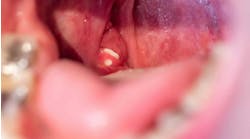by Anne Nugent Guignon, RDH, MPH
[email protected]
Yesterday, I heard an interesting challenge. It was a call to move forward with one's life. At the end of the presentation, the speaker posed two questions about getting involved in a particular activity. What do you have to lose by participating, and what can you gain by getting involved? Each one of us should ask these two questions each time we are faced with making a change in our lives.
Change is an interesting subject. Most of us would like to think that we are in charge of the changes in our lives. But unforeseen and unplanned events can literally alter our lives in a split second. Insurance plans, avoiding risky behaviors, and living a healthful, stress–free life are all key ingredients to keeping our lives under control. But, realistically, how many of us are really prepared for “the accident” that will change our lives? Can we transition those circumstances into a better outcome?
All of these questions and challenges faced me one year ago. On the last day of the 2008 Chicago Midwinter Meeting, I suffered a serious, permanent meniscus tear in my right knee. The flight back to Houston was a nightmare. Ice packs and painkillers did little to numb the pain. Surgery was the only alternative.
This singular event changed my life. Surgery was only the initial step toward recovery. Making the commitment to physical therapy was essential to gaining presurgical strength and agility. Years of traveling, ignoring calories, and not taking the time to exercise had taken their toll and added inches to my waistline.
The most current reports indicate that two out of every three Americans are either overweight or obese. Our lifestyles are sedentary, filled with way too many trips to quick service restaurants, and endless soft drinks. A very revealing report called “F is for fat” was released by the Robert Woods Johnson Foundation last August. The document painstakingly examines the complex dynamics that have created a problem of epidemic proportions that is taxing our health–care system, contributing to the development of a wide variety of serious and often irreversible chronic diseases.
Physical therapy was hard and boring. The young therapists had few suggestions on how to adapt the prescribed exercises to a road warrior lifestyle, which was surprising since most dental professionals are adept at customized home care recommendations to a patient's specific needs, skills, and willingness to participate. The co–pay ran about $60 to $90 a week depending on the number of visits. It didn't take long for me to lose interest in doing therapy under the supervision of women who appeared bored with their jobs. But despite their apparent lack of interest, the surgical recovery was still dependent on ongoing, targeted exercise.
One day, a postcard from a gym called Sound Fitness showed up in the mail. The special offers piqued my curiosity. The devil's usually in the details, but an onsite visit revealed a clean facility with dozens of bikes, treadmills, elliptical trainers, and a plethora of weight–training machines. The hours are extensive, the fees are reasonable, the staff is friendly and helpful, and it's five minutes from my house. The list of reasons for not making the commitment was nonexistent.
The information in “F is for fat” made sense and added fuel to my quest for change. The clothes in my current wardrobe started getting baggy and a trip to the closet produced about a dozen outfits that I had not worn in three or more years. My knee started feeling better, and my mobility and flexibility improved. One little fact in the report spurred me on. Every pound of weight loss is the equivalent of taking four pounds of stress off the knees. That little tidbit has kept me returning to the gym on a regular basis. Knee surgery is not fun, and I want to do all that I can to avoid a repeat trip to the operating room.
It's never too late to recommit to a healthier lifestyle. It takes creativity, clear focus, and commitment to change. As hard as it is to move out of one's comfort zone, it is possible and the results can be rewarding. If we are going to help others achieve better health, it's important that we examine the changes we need to make in our own lives.





